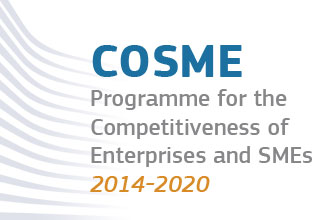 newsitems
newsitems  UK Minister, CoE chair Brokenshire+ to EuroFora on CyberCrime +CoE Internet Governance Strategy 2015
UK Minister, CoE chair Brokenshire+ to EuroFora on CyberCrime +CoE Internet Governance Strategy 2015
UK Minister, CoE chair Brokenshire+ to EuroFora on CyberCrime +CoE Internet Governance Strategy 2015
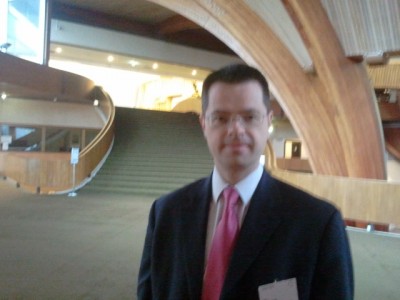
*Strasbourg/CoE/Angelo Marcopolo/- UK's Home Office Minister for Crime and Security, current CoE's Chairman in office (11/2011-5/2012), James Brokenshire, speaking to "EuroFora" at the conclusion of a 3 Days-long International Conference on the 10th Anniversary of CoE's "CyberCrime" convention (2001-2011), which had started to apply at the Internet the post-9/11 urgent need to Fight Crime Worldwide, strongly supported this already existing tool's potential also for the foreseeable Future, while also leaving open a currently unfolding possibility to soon develop a comprehensive, overall CoE Internet Strategy, which might cover all main, topical issues, from Freedom of Expression and the Fight against Digital Divide up to Cyber Security and Protection against Cyber Attacks, etc., due to be debated at the end of this week in another CoE Conference in Vienna (Austria) and expected to be eventually adopted by the CoE's Committee of Ministers, under Brittish Chairmanship, probably on January 2012, as a 1st response to the call launched recently by the "G-8" Summit at Deauville (France) to establish at least the General Principles of a Global "Internet Governance", (See relevant "EuroFora"s NewsReports on that "G-20" move from Paris, Deauville and earlier CoE events).
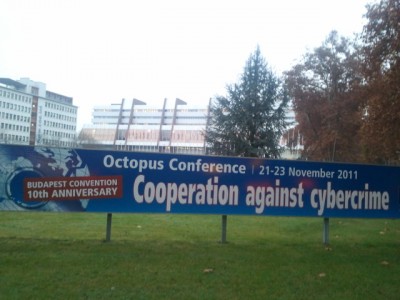
Such moves might succeed to bypass an old opposition between a mainly UK-USA preference, backed by several other Countries in Europe and throughout the World, to continue building on the 2001 "CyberCrime" CoE's International Treaty opened to signature on 2001 in Budapest, and a rather Russian and Chinese, etc. critical stance, more or less backed also by various European and other Countries, which, while acknowledging the importance of having efficient Legal tools to Fight Criminals abusing of the Internet, nevertheless, has already made known its reluctance to accept mainly some reportedly "Extra-Territorial" Jurisdiction aspects of the Budapest 2001 Treaty, preferring rather to build another, New Legal Instrument, (as, f.ex. a Russian Senior Officer had earlier told "EuroFora" in a previous CoE's "CyberCrrime" conference).

In this regard, the position of some other key European Countries appeared rather reserved, as f.ex. Germany, who sent to the 2011 "CyberCrime" Conference only one Expert, contrary to other Countries who had sent more than 4 or 5 Experts, and/or a Political, f.ex. Ministerial representative or Attorney, (f.ex. even .. Nigeria or Benin, etc), as well as Italy, (among the entirely "Absents", even if it has ratified the 2001 Budapest Treaty, as also France, present with 4 Experts but without Political level representative, contrary, f.ex. to Hungary, etc) and several other EU Countries which abstained from participating this time, (while also Poland and others have signed but not ratified, similarly to South Africa, Turkey, etc), unlike to an exceptionaly High proportion of International guests from many other Countries throughout the World, (including f.ex. Australia, Japan, but also several African Countries, etc), which underlined the obviously Global dimension of what is at stake.
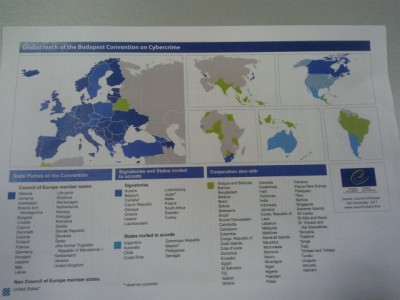
As for Citizens and NGOs, European Civil Society will certainly look with interest, to CoE chair i.o., British Conservative Home Minister James Brokenshire's concluding reply to "EuroFora"s questions that, as a matter of general Principle, "Liberty and Fighting against Criminality go hand by hand" (See infra) : An obviously very interesting, Strategic remark, for which ..."the proof of the pudding is in the eating", according to the well known moto of traditional British People...
--------------------------
- "We (the UK Chairmanship of the CoE) strongly believe that the CyberCrime (CoE) Convention provides an Effective Mechanism to promote Cooperation, Practical Assistance to help Countries, and also to set a Legal Framework, which is really important, with all its Benchmarks, in order to ensure that we are always working within a Common Approach dealing with the Threats of CyberCrime that strech the on-line environment when we want to Harnest the Benefits which should come from it, while also ensuring that we have processes and procedures in place to Guard against the Criminals who are starting, increasingly, to prey upon People who are trying to use if for their Business and for their Daily lives", stressed to "EuroFora" from the outset Brittish Minister James Brokenshire, who, as CoE's Chairman-in-office, was the Key-note Speaker at the concluding ceremony of the 1Oth Anniversary of the Budapest treaty.
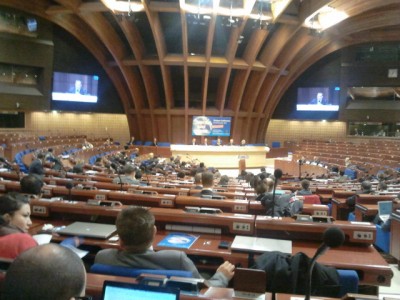
- "And this is a Positive, Practical Message that we (CoE) are giving around the Convention (Members) and around the World, that Countries are doing, and want to continue to do, in Combatting CyberCrime and the Threats that are opposed" to a productive and safe use of Internet's potential, Minister Brokenshire went on to say while participants to CoE's CyberCrime mechanism were reportedly preparing to add 2 more Days of work in Strasbourg in order to develop further its technical possibilities to enhance TransBorder, International Investigations, find how to tackle the new issues raised by Cloud Computing, etc.
+ Moreover, "it certainly is part of our (UK's) Chairmanship (of the CoE), to seek" to promote "Internet Governance (as, f.ex. the latest "G-8" Summit asked on May 2011 at Deauville, i.e. symbolically chosen by French President and G-8/G-20 Chairman Sarkozy between France and the UK, as "EuroFora" reminded to Brokenshire), and we are looking how to promote the greater Adoption of the Budapest Convention. Indeed, we'll continue to develop the Agenda of Internet Governance, as well as to look at the Legal Frameworks that prevent from operating and detect Crime : That's what Today's event is very much about", the British Minister added more largely, but without losing sight of his main, topical target. '"And, certainly, from the (earlier) London Conference (on "Cyber-Space"), that sense of (Internatinal) Cooperation, that sense of (Global Internet) Governance, (includes also) Citizens working together, because it's their Shared Responsibility. That's why, from a UK perspective, we are very much working with Business and Industry, recognizing that, so much of the Infrastructures, so much of the Work resides Outside of Governments", he observed. "And, so, looking forward, we are very much keen to promote that Agenda, looking at ways in which should Government Internet Governance can be Improved and adopted, looking how Collectively we can work Together to Advance the Issues around Combating Crime. Probably, I would say, working in Parallel, (on the overall Internet Governance and specifically on CyberCrime, because) they are Both Important", he concluded.
- "In the (recent) London Conference (on Cyber-Space), British Foreign Secretary William Haig, had said, earlier in Strasbourg (See previous "EuroFora"s NewsReport), that the UK Government had tried to promote the idea that by combatting Cyber-Crime, States also Protect Citizens' Safety and Freedoms, which, in addition to Corporations and States, are also one among the first Victims of several Cyber-Attacks", "EuroFora" reminded to the British Home Office Minister, recalling also the fact that "the present (Conservative-Liberal) UK Government was Elected also under a banner calling to "Restore People's Liberties"", back on 2010...
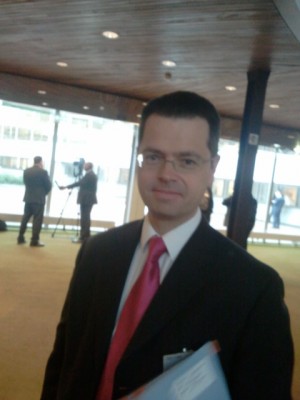
- "Absolutely", replied positively, smiling, to that "EuroFora"s question, the young, British Conservative Government Official, who sits also at the National Security Council, dealing even with Strategic issues of larger Political importance : - "We are very much on the Protection of Liberty and Security of People's Data. And, as we live our Lives increasingly On-Line, Protection of People's Private Information is, I think, a Key-element around all the work, and how Criminals very much are looking tackling to this, to be able to obtain People's Private Information, to Sell that on the Internet in a Criminal, Black Market way. So, when we look at this Agenda, it's important to also look at Both Threats : (I.e.) - Look at what the Criminals are seeking to do, but also into Advancing an Open and Free Internet, where we are able to Harnest practical Opportunities of Trading, of virtualy live all our Lives in a Digital way. How that is a Positive thing, that we certainly want to Promote, but, recognizing that there are (also) those out there, who want to use the Internet for Malign purposes. Respecting that sense of Freedom, Personal Liberties, but also being very Clear and very Firm in our Response to those who seek to prey on the Vulnerable, seek to Exploit the Internet to commit Crime, and to commit Serious Harm (even) to Individual Citizens. That is why, I think, the whole concept of Liberty and Fighting against Criminality go hand by hand", he smartly concluded.
___________________
USA State Secretary Clinton's Cyber coordinator, Christopher Painter, to "EuroFora" : - Multi-stakeholders approach, and stick to the already existing tools : a must !
---------------------------------------------
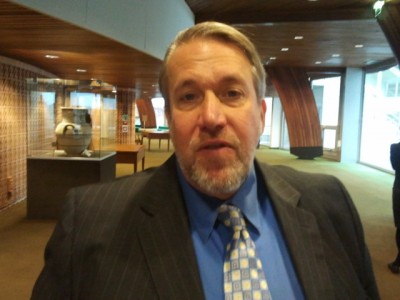
Meanwhile, CoE's CyberCrime convention is a useful Tool manly for issues of "Law, Training, and Cooperation", stressed USA State Secretary Hillary Clinton's Cybe coordinator, the CoE-experienced Christopher Painter, speaking to "EuroFora" :
- Questioned by "EuroFora" if the U.S. position would be favorable for the call launched by the recent May 2011 "G-8" Summit at Deauville to start building a Democratic Internet Governance, to result in a kind of New, Comprehensive, overall Legal Instrument for all main Internet issues, or, rather build upon already existing tools, such as CoE's CyberCrime convention, etc., the American Official appeared adamant :
- "I think that what we have now should be strenghened. What we need to do, as (USA) vice-President Biden said (in an earlier, London Conference on "CyberSpace"), we should Strengthen those Institutions, make Sure that they have more Transparency, make sure that they are more Inclusive, etc."
+ On the contrary, " I think that what is the Wrong way to go is to have some Srructures that is (inter)Governemental, rather than Multi-StakeHolders', etc. I think that this is reflected even at the Statement from the "G-8" at the Deauville Summit, where there was an explicit reference to the need for Multi-StackeHoldfers. And in the Drafts that we have at present, (also on CoE's "Strategy for Internet Governance" ; See infra), there is a clear mention that they have to include a Multi-Stakeholder approach.
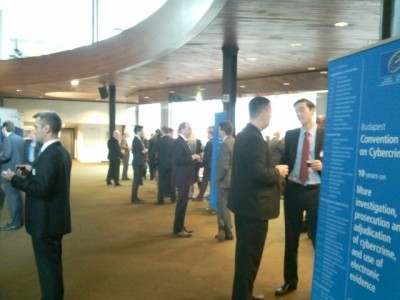
- "Any model, even the models that we have now, need to include the Private Sector. They need to include the Governments. And they need to include Civil Society. And they all (3) have to be Driving Forces" - "I'd tell you, even the Internet itself would not have developed to the point that it is now, without that really robust process. And that's what we need to strenghen", artfully concluded Painter.
- I.e. "our (USA's) view is that the Best way to go, is to Strengthen the Institutions that we have now, and make sure, (f.ex.) that they include that Multi-Stakeholder approach.
- F. ex., "OECD Internet Principles, adopted last June" 2011, (i.e. practically when the International Organization celebrated the Anniversary of 50 Years since its it was established, Comp. "EuroFora"s NewsReports from that OECD event in Paris, May 2011, at the eve of the "G-8" Summit at Deauville), on Internet's need for Transparency, etc., are a Good Example of that Multi-Stakeholders approach", while "talking about Internet, Security, all the issues, in a very Interesting way, which shows what we are trying to do", the American Official pointed out.
-------------------------
CoE Information Society Director, Jan Kleisjen : Wider, Comprehensive CoE Strategy on Internet Governance, after G8 Deauville Summit :
__________________
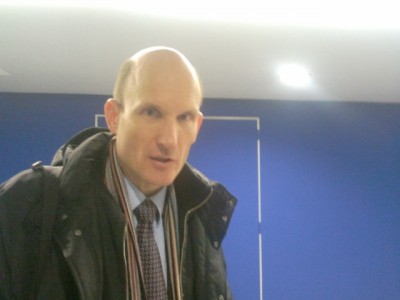
+ Experienced CoE's Director of Information Society and action against Crime, Jan Kleijssen from Austria, speaking to "EuroFora", explained CoE's current moves for a "Comprehensive Strategy on Internet Governance", shortly after the relevant call launched by the latest "G-8" Summit at Deauville, (France : See "EuroFora"s relevant NewsReports from Paris and Deauville, as well as earlier from the CoE).
He spoke earlier, during CoE's "CyberCrime" treaty's 10th Anniversary events (2001-2011), about the PanEuropean Organization's intention to develop in a coherent manner a kind of Synhesis of all its various Legal tools concerning the Internet, from the Personal Data protection treaty, to CyberCrime, as well as Children protection from Sexual abuse, Freedom of Expression, easy Access and Free transborder flow, etc., all these Pieces of the Puzle accumulated by the CoE through many years, should now be brought together inside an overall, Comprehensive new instrument, before 2015.
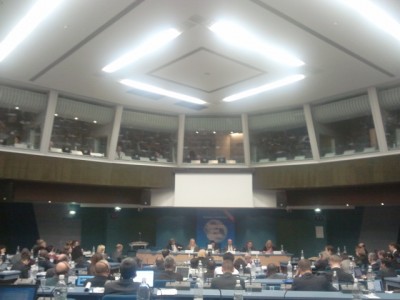
- F.ex. on Monday, in Monaco (where Princess Caroline is very active on that), we (CoE) discussed about Children protection at the Internet, and (Personal) Data protection, which is part of it, was debated in Strasbourg, where now we hold the CuberCrime convention's 10th Anniversary, he reminded to "EuroFora".
- "In Vienna, on Thursday and Friday, we have several Ministers (from various CoE Member Countries) coming, and it will be opened by the Federal vice-Chancellor of Austria, Foreign Minister Michael Spindelegger), together with our (CoE"s) Secretary General (Norwegian Thorbjorn Jagland), with representatives from Industry, as here (i.e. in Strasbourg's CyberCrime conference), as well as NGOs, etc.
- The Concluding Draft Text on CoE's 4 Years-long "Internet Governace" Strategy, 2012-2015, will be submitted to its Committee of Ministers, here in Strasboourg, for them to decide, probably from January 2012, (i.e. during the British CoE Chaimanship (November 2011-May 2012), including 2 CoE's Budgetary Cycles of two years each, he anounced.
- "It is a Comprehensive text : Personal Data, Protectiion of Children, Persecution of Crimes, Free Speech and Liberty of Expression, etc., are included, Kleijsen observed. And "this is , indeed, very Interesting : It's a Privilege to work on it". Particularlu when "you know that the 1st Page was published at the Internet, (as we see it now, i.e. with today's layout and "www", etc.), only on August 6, 1991 ! So, You see what's happening in just 20 Years !", CoE's expeienced Top Official enthousiastically added..
+ But, obviously, there are also Threats, from Criminals, even Organized Crime, i.e. not only Individuals, because, as we heard in this (CyberCrime) Conference, there is a lot of Money to be made, and that's why, (CoE's) Internet Strategy package will deal with Freedom of Expression, but also of its counterpart. One of your Collegues (among Strasbourg Journalists) asked me : - "What has the CoE to do with Internet ?". It's simply because this Organization stands for Human Rights, Democacy and Rule of Law, while, Today, you can't even have those 3, without Intenet these days. That's clear !", I replied", Kleinsjen pedagogicaly stressed.
- "Since today, even in order to simply deal with the Administration, you need access to Internet : In some countries, f.ex. In Kenya, the Government doesn't send out any Forms : there are Cheap Mobiles, and all the Tax process goes through a Mobile (Tax declaration, Census, etc.; whatever ", as also in Greece, f.ex. today some new Taxes are collected through SMS between Citizens and the Administration, as "EuroFora" observed...
+ Access to Internet, f.ex. in Rural areas, can bring poor People into the mainstream, while in some Mountainous areas, where even the Postman doesn't come yet, thanks to the Internet and/or Mobile netwok you can communicate, etc.
- "So, we (CoE) try to bring all that together", and "we (CoE) hope that we'll have from this Vienna Conference a lot of Ideas : We hope (that) People will be critical, positively critical, i.e. by sending some Suggestions, etc. Because there will absolutely be a full participation from Civil Society, NGO's, involved individuals, etc., as all other participants, able to speak, etc. ; that's the idea", Kleinsjen agreed with an "EuroFora"s question on that obviously crucial point.
In this regard, "EuroFora" reminded Kleisjen the Fact that, contrary to the Past, when f.ex., as early as back on 1988 we had been given the responsibility by Strasbourg's University to prepare a Pioneer Legal Research on what was called then "Cabled Video-Communication Networks", and became later the "Internet", when the main concern was obviously to protect People, Businesses and even States from Risks to Violate the Privacy of their Personal, Private, Secret Data, and usurrpate them even on Sensitive issues, later-on, after the September 11, 2001 Terrorist Mass Attack against the Twin Towers of the World Trade Center in New York, the trend had notoriously changed, giving an absolute Priority into searching and finding any eventually useful infiormation which might help the fight against any suspicion of any kind of planned Terrorism, provoking, sometimes, certain well-known abuses, which might, perhaps, be overcome now, with a more "Balanced" approach.
- Thus, questioned by "EuroFora" whether CoE's pioneer work on "Personal Data protection and Privacy" was going to "Survive" in Future, CoE's experienced Director acknowledged that this a Serious issue, and observed that, "of course", "someone at Nairobi"'s recent World Internet Forum of the UNO, observed that "Internet taxes Privacy", and "we (CoE) have that Convention", i.e. the Pioneer Internatonal Treaty on Personal Data Protection, "which we must Modernize it, bring it up to date" :
- "F.ex. we (CoE) are looking at ("New") Questions such as Social Networks, Responsibilities, etc". And, "of course we want to do it together with the Industry, since there is no point for a SIngle Country to try to impose alone anything on the Internet, because, then, People move along" various other providers of service in many other countries in the World Wide Web, etc.
- The point is "to come to a Responsible Data Protection" review today. "it's obvious, also, that Companies realize that People may go to Facebook or anoher Social Media, if there is, at least, a Minimum of Trust", (that their Personal, Private Data will have, at least, an elementary protection. On the contrary, "If there is No Trust at all", on that crucial point, then,¨People will go elsewhere and/or do otherwise. For the moment, "It's all New now". But, "if Companies want to survive", in front of growing Global Competition on the WWWeb, "then, they'd realize that they have to Earn the Trust of the People. They must have Trust : It's almost like a Bank : You go to a Bank if you trust it" enough to leave there your money... So that, "if one or another Internet Company commits Serious Abuses, then, sooner or later, this will become known" to the large Public, People wlll find out quickly, and it will loose its Customers, since People will go away !" In consequence, "they (Internet Companies) have also a Business interest to build Trust" with the People, the experienced CoE Top Official warned...
He was replying to an "EuroFora" reminder of the concrete case, f.ex. of Icelandic MP Birgitta Jonsdottir, who had earlier said to "EuroFora" that she was satisfied by the fact that "Twitter" had, at least, warned he that she was reportedly targetted by a "Gag order" from an US Administration in order to reveal all her Personal Account's Data, so that she had a chance to lodge a complant at an US Court against that, on grounds both of Personal/Private Data pcotection, and of Political and other beliefs, f.ex.of the Persons who had used that Web account to communicate with her as an MP on "Sensitive issues", while, on the contrary, "Facebook" had told her nothing, until now... (See relevant "EuroFora" NewsReport dated from 4/2011)
+ Speaking also of another Topical issue, that of Hackers' "Attacks" via the Internet, Kleinsjen pointed mainly at the "obligation to cooperate in doing Investigations, research, etc., when it's a trans-border" crime, which already results from the CyberCrime CoE Treaty, but is also included in the new CoE's Internet Strategy draft.
- Concerning Citizens, (and not just States or big Corporations) who might also be Victims of Cyber Attacks, he considered that by warning People, they will become aware of the Risks and go get equiped themselves by some Software and/or Harware technical protection, while, at the same time, "they should Report" to the Police and/or any other competent Public Authority, any eventually serious attack that they might face through the Internet : - "Already there are several Specialized Police teams for that (Cyber Attacks, etc), but what happens too little, at least for the time being, is for People to go and see them : Only an estimated 21% of the Victims of Internet Attacks report it to the Police !", denouncing the facts. "But, the Police can't do anything if People don't speak about it, if they have no complaints : They Need complaints, in order to Start Investigations", he observed, speaking to "EuroFora" shortly after a Team of CoE's Experts had just concluded by making a strong appeal to all involved Countries to etablish "Specialized Police Units" on CyberCrime in general.
---------------------
+ However, from the Pre- 9/11 period of the CoE, "EuroFora" remembers also well that the Committee of Ministers of the PanEuropean Organization had also adopted, as early as back since 1998, at Thessaloniki (Greece), a landmark Resolution focusing on facilitating People's Access to the Internet and other modern Communications, where it had launched also a call for a network of "Public points of Access" to be established, in order both to develop Internet litteracy and capacities, but also to avoid the Risk of a Digital Divide.
Or, except from an indirect, and apparently incomplete mention in Article 8, point "C", of the current CoE's Draft "Strategy", this seems curiously forgotten or ommitted today..
=> Therefore, "EuroFora", for the moment, can't but make at least one "Critical Suggestion" to CoE's Draft "Strategy on Internet Governance" : - Restore the Spirit of the 1998 CoE's Ministerial Summit's Recommendation on Access to modern Communication technologies ! (Comp. supra).
(NDLR : This obviously is an incomplete, hasty "DraftNews", as already sent earlier to "EuroFora"s Subscribers/Donors. A complete, more accurate Final Version is due asap., unless the issue is eventually included in another, new relevant development).
***
Main Menu
Pagina principale Press Deontology/Ethics 2009 Innovation Year EU endorses EuroFora's idea Multi-Lingual FORUM Subscribers/Donors FAQs Il Elxis licenza EuroFora supports Seabird newsitems In Brief European Headquarters' MAPs CoE Journalists Protection PlatformBRIEF NEWS
- 00:00 - 02.06.2021
- 00:00 - 18.10.2020
- 00:00 - 19.06.2020
- 00:00 - 18.05.2020
- 00:00 - 20.04.2020
- 00:00 - 02.02.2020
- 00:00 - 09.12.2019
- 00:00 - 27.11.2019
- 00:00 - 16.11.2019
Popular
- Yes, we could have prevented Ferguson riots says World Democracy Forum's Young American NGO to ERFRA
- Spanish People Elect CenterRIGHT Majority with 1st Party and Total of 178 MPs (6 More than the Left)
- Pflimlin's vision
- The European Athletic "Dream Team", after Barcelona 2010 Sport Championship Results
- Source Conseil d'Europe à ERFRA: Debatre Liberté d'Opposants à Loi livrant Mariage+Enfants à Homos ?
- Head of BioEthics InterGroup, MEP Peter Liese : "Embryonic stem cell research reaching its END" !?
- Spain: Jailed Turkish Terror suspect with Explosive,Drones,Chechen accomplices stirs Merah+ Burgas ?
- UN Head Ban Ki Moon at CoE World Democracy Forum : - "Listen to the People !"
Latest News
- EUOmbudsmen Conference 2022: Digital Gaps affect People's Trust threaten EF Project on EU Future ?
- French Election : Black Out on Virus, but Obligation for Fake 'Vaccines" Challenged
- Both French Presidential Candidates point at "Humanism" in crucial times...
- France : Zemmour = Outsider may become Game Changer in Presidential + Parliamentary Elections 2022
- PACE President Cox skips Turkey Worst (Occupation) case compared to Russia (DeMilitarisation) query
Statistics
Ospiti: 59153046Archive
Login Form
Other Menu
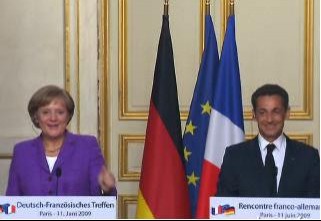
The official presentation of a "Program" respecting People's choices voted in the June 7, 2009 EU Elections, to be debated in EU Council and EU Parliament during its 1st Session on July in Strasbourg, is the No 1 Priority, according to Democratic principles, for the Franco-German axis, said the main winners at the ballot box, French President Nicolas Sarkozy and German Chancellor Angie Merkel.
They stressed that the New EU Commission's President must have a "Program" in favor of an EU which "protects" its Citizens, regulates financial markets and aims at a "Political" Europe" : a wording they have used as incompatible with Turkey's controversial EU bid.
They also declared ready for a "political" endorsment of "Mr. Barroso's candidacy" in June's EU Council, considering that an official decision would have to be made after EU Parliament's debates and votes, possibly from next month (July), with the legally necessary final acceptance shortly after Lisbon Treaty's entry into force, hoped for September or October.
- "A Program, and Mr. Barroso" : This resumes, in substance, the anouncements made by Sarkozy and Merkel, on the question of current EU Commission's President, Barroso's declared wish to succeed to himself for a second mandate, to be extended during the following 5 years.
In their 1st meeting after EU Elections, they observed that "the Franco-German axis counted in European Elections' campaign... But, we both keep a realistic view : We saw the number of those who abstained, and we must absolutely give them an answer. We also see the disilusionment of an important number of Europeans vis a vis Europe, and we are aware of the responsibilities we have".
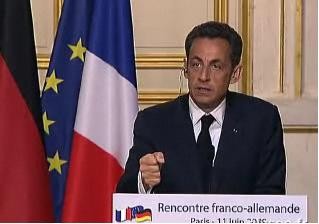
- The "Duty" of the new EU Commission's President, after June 7, 2009 EU Elections' result, "is to act for a Europe which protects the Europeans, to commit himself into working for a better Regulation of Financial transactions, ... and to have a Political will for Europe", underlined Sarkozy.
Therefore, "we have asked M. Barroso... to clarify, to officialy present the intentions he has", he anounced.
- "We want to speak also about the Programme", explained Merkel.
- "It's important that for the next EU Parliament's mandate (2009-2014) we take the right Decisions for Europe. Obviously on Persons, but mainly Decisions on Issues", she stressed.
- "It's not simply a question of a Person, it's also a question of a Programme". We are "really asking Mr. Barroso to commit himself on a Program, and on Principles, on Values", Sarkozy added.
EU President-in-office, Czech Prime Minister Jan Fischer, accepted the Franco-German stance :
- "Barroso must present his Programme. The Czech Presidency agrees with that", Fischer reportedly said later, after meeting Sarkozy.
But Press reports from Brussels claimed that Barroso had preferred to be officially appointed by EU Council since June, (i.e. next week), "because this was implied by the current Treaty of Nice, according to him", and considered any delay until the possible ratification of the new, Lisbon Treaty on September/October, as "undemocratic".
- "At any case, independently of what Germany and France ask, it's also EU Parliament's wish". "We shall propose Mr Barroso's candidacy... But even in the framework of Nice Treaty, EU Parliament has to be associated in this Decision", the French President observed.
If this is correctly done, then "we support Mr. Barroso's candidature", and "if the (EU) Parliament agrees, we might ratify this decision since July", (i.e. next month), they both said.
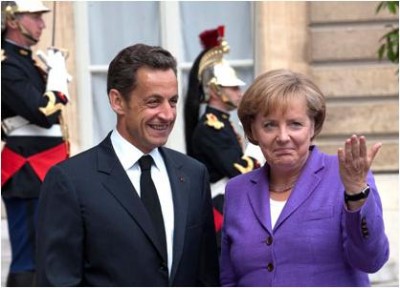
- "France and Germany support Baroso's candidacy, But we want to speak also on the Program. We believe that this Program should be established in close cooperation with EU Parliament, and that's why we have followed an appropriate way", said Merkel. - If EU Parliament wants, this election can take place on July, but this must be done in full agreement.
- "We shall support Mr. Barroso's candidacy, without doubt", said Sarkozy. "But we have asked from Mr. Barroso, as I told him yesterday, to put into detail.. his intentions, at the eve of his 2nd mandate, if the situation avails itself.
France and Germany "don't want to take an Official Legal Decision by writting" during "the next (EU) Council" (on June 18-19), declared Sarkozy. Because they prefer, at this stage, only "a Political decision" on June, "so that we (EU Council) can work together with EU Parliament", which starts to meet only Next Month, since July in Srasbourg, "leaving a Legal decision by writting for later".
- "If the Conditions are fuillfiled in EU Parliament, we (EU Council) are ready to give the agreement and make it offficial", said Merkel
- "But, now we are working in the base of Nice Treaty. If tommorow we want to work in the spirit of Lisbon Treaty, we have to find a proper way", she added.
- "Of course it's Legally complicated, because we are going to make a Political proposal to the forthcoming Council, for an EU Commission's President, on the basis of Nice Treaty : So, we (EU Council) will not appoint the Commissioners. Only the President. If EU Parliament agrees, it could endorse this position on July", explained Sarkozy.
But, on Autumn, "if Ireland ratifies Lisbon Treaty, there will be, at any case, a 2nd Decision, to appoint the Commission's President, this time on the basis of Lisbon treaty, and then, we, the EU Member States, would have to appoint (also) the EU Commissioners", he added.
As for the precise Timing : - "Everything is suspended until the Irish vote... Now, we must all make everything possible to help Ireland to say "Yes"" to Lisbon Treaty... The Irish Referendum, ..will take place either on September or on October. It's a Question which depends on the Irish. And, then, we shall have the Choice of the Candidates for the permanent Institutions of Europe".
However, "if Ireland says No, we, French and Germans, have to assume our responsibilities, and we'll do so", he concluded.
But British and Swedish governments were reportedly eager to have a final EU Council decision on Barroso since this month, on June's European Council. While the other EU Member Countries are divided, several of them preferring to wait until EU Parliament pronounces itself, on July, and/or until Lisbon Treaty might be ratified by Ireland at the beginning of the Autumn. Barroso's current mandate ends on November.
There are also various, contradictory and/or unpredictable reactions inside EU Parliament vis a vis Barroso's wish to continue a 2nd mandate, because many MEPs are openly or secretly opposed, reluctant, or hesitating.
In the biggest EU Countries, as France and Germany, EU Citizens voted on June 2009 EU Elections for a renovated, non-technocratic but Political Europe which cares for its Citizens, with an Identity, Values and Borders, declared incompatible with Turkey's controversial EU bid, by mainstream, pro-European Governing Parties. Similar choices were also supported in several other small or medium EU Countries.
On the contrary, whenever, in other Countries, Governing and other mainstream Parties didn't make these choices or eluded them, EU Citizens massively voted for euro-Sceptics whenever they were the only ones to to promise anti-bureacratic change and oppose Turkey's demand to enter into the EU, (f.ex. in the UK, Netherlands, etc).
It's seems to be an Open Question whether Sarkozy and Merkel's conditions will be really accepted by Barroso, who was appointed on 2004 in a different political context, (with Socialist Prime Ministers in Germany, France, etc), had rejected in the Past the idea of EU becoming "equal to the USA" as "ridiculous", and pushed for Turkey's contoversial EU bid, trying to "soften" or contain the changes desired by the People who voted for Merkel and Sarkozy with another policy vis a vis Turkey on 2005 in Germany and on 2007 in France, as they did all over Europe on 2009.
In addition to many EPP Governments, it's 3 remaining Socialist Prime Ministers : Gordon Brown in the UK, Zapatero in Spain, and Socrates in Prortugal, who support Barroso, as well as Liberal Swedish Prime Minister Reinfeldt. But their Parties lost the June 2009 EU Elections.
Questioned whether there was still "Time" for "other" possible "Candidates", Sarkozy and Merkel did not deny, nor made any comment on that, but simply said that "it's not for us to make publicity for any candidates. We anounced our choice ("A Program, and Mr. Barroso"). But we respect any other candidate".
Among various other names cited are former Belgian Prime Minister Verhofstadt, former UNO's Human Rights Commissioner Mary Robinson of Ireland, Italian former EU Commission's vice-President Monti, etc. Meanwhile, Luxembourg's PM Juncker, (who had been unanimously accepted by EU Council for EU Commission's Presidency on 2004, but refused), announced his intention to resign from "EuroGroup"'s Chair. Thus, he might be available for another Top EU job.
As "EuroFora"'s "opinion" said (See publication dated 9/6/09) : - "If the current candidates (i.e. Barroso, etc) to the Top EU jobs promise and guarantee to respect People's democratic choices, then, it's OK".
"Otherwise, Europe must find new candidates, really motivated and able to implement these democratic choices of the People."
Because, "in Democracy, the forthcoming choices for EU's Top Jobs,...should be made according to EU Citizens' Votes in June 7, 2009 European Elections, and main EU Governments' strategic policies".













